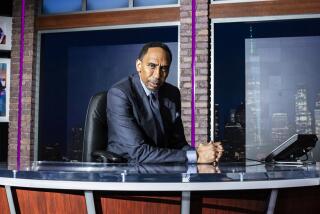When TV Takes a Stand
Some leading TV producers make no bones that they are using the nation’s most influential soapbox to express their own political and social views.
Sitcom and dramatic series heroes and heroines more and more frequently take sides on social issues and express opinions on matters of the day.
Take Murphy Brown for instance. The TV journalist on the popular CBS comedy recently was called before a Senate committee probing the source of a leak to newspapers.
Brown quickly characterized the committee as a cabal of male bumblers more interested in muzzling the press than getting at the truth.
“Murphy expresses a quite liberal point of view,” says Diane English, executive producer of “Murphy Brown.” “It’s also my point of view, but her point of view isn’t always mine. She’s a dyed-in-the-wool Democratic liberal. I think a character is as entitled to have political opinions as she is to have a dog.”
Earlier, executive producer Linda Bloodworth-Thomason expressed her anger over what she perceived as Anita Hill’s ill treatment by the all-male Senate committee, during the Clarence Thomas Supreme Court hearings, through the mouth of one of the show’s characters, Mary Jo, on an episode of CBS’ “Designing Women.” The character of Allison presented a view defending the committee.
Increasingly, series are not only taking stories from real life but are presenting them from a particular point of view. It goes beyond such safe topics as taking a stand against drunken driving, drugs or racial prejudice.
NBC’s “I’ll Fly Away” views the 1950s social upheaval in the South through the eyes of a black housekeeper. Norman Lear’s new “The Powers That Be” on NBC is a satirical look at the nation’s leadership. CBS’ “The Trials of Rosie O’Neill” examines the judicial system from a liberal view.
“Obviously, writers and producers are passionate about their work,” says Warren Littlefield, president of NBC Entertainment. “They write from their heart. Some of our best work can come from that. I think there is a balance that we as broadcasters try to take. We want to be inspired, we want it to come from the heart. But at the same time we want to present to the audience a fair and an unbiased view--perhaps not on an hour-to-hour basis but overall.”
Most producers say that while they may include their own views they also seek a balance. If they don’t, it’s often imposed by the networks, who fear offending minority groups or losing advertising.
Advertisers have withdrawn commercials from such series as “Murphy Brown,” NBC’s “Quantum Leap” and “Law and Order,” ABC’s now-defunct “thirtysomething” and “The Trials of Rosie O’Neill.”
“Our own bias has a tendency to come to the fore, but who could answer that question with honesty any differently?” asks Barney Rosenzweig, executive producer of “Rosie O’Neill.”
“We made a deliberate choice to make her a public defender because the people who work for the public defender’s office are by and large very dedicated affiliates of the American Civil Liberties Union. We don’t make a secret of the show’s liberal bent. But her opponents, in her case her own family, are much more politically toward the right of center.”
Norman Lear has been deeply involved in controversy in the past, with such shows as “All in the Family” and “Maude.” His summer show “Sunday Dinner,” which dealt with spirituality, aroused the ire of some religious fundamentalists.
“You can’t possibly do anything in television without some opinion,” Lear says. “If you’re doing a family show, that’s your opinion of family life. (On “Powers That Be”) we’re doing a show about a dysfunctional family, the patron of which is a United States senator. He’s not based on any individual. He’s based on the way we look at the Senate. As to what that is, I would prefer that each viewer draw his own inference.”
Executive producer Dick Wolf says NBC’s “Law and Order” thrives on examining controversial issues under the umbrella of the criminal justice system.
“In the first season it led to the highest pullout rate by advertisers on any show on any network,” Wolf says. “One on abortion clinic bombing, one on assisted suicide for AIDS patients--massive advertiser pullout. What the advertisers finally realized was that the audience watched ‘Law and Order’ for the very reasons they were pulling out of the shows. They wanted to see a realistic, adult depiction of controversial issues that did not water down the issues to make them acceptable to advertisers.
Such an advertiser pullout arose over an episode of NBC’s “Quantum Leap” in which a gay military cadet considered suicide.
“We don’t set out to do issues that are controversial,” says executive producer Don Bellisario says, “although along the way we may do something that becomes controversial. Earlier this season we did a show in which the main character takes over the body of a chimpanzee. One of the writers said let’s make him a research chimp, and I said great. The writer got all of his research material from what turns out to be an animal rights group. I read the script and found it was a very one-sided propaganda piece. I said it was unacceptable because it had no balance in it.
“The next thing we’re caught in a controversy between the biomedical community and animal rights activists. I am in the middle of the issue...
“Hollywood’s always been accused of being a liberal, left-wing society. I’m not one of those people. I’m kind of on the other side.”
More to Read
The complete guide to home viewing
Get Screen Gab for everything about the TV shows and streaming movies everyone’s talking about.
You may occasionally receive promotional content from the Los Angeles Times.






